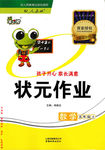题目内容
At the meeting they discussed three different to the study of mathematics.
A. approaches B. means C .methods D. ways
A
【解析】:approach-ways of dealing with a person or thing 常和介词to搭配;means-action by which a result is brought about手段强调用行动,常和of搭配;method-way of doing something常和介词of 搭配一般多指比较系统理论性较强的方法;way-方式、方法,最普通的用法常和介词of搭配或者动词不定式to连用。
【考点】:同义、近义词用法辨析
【易错点】:由于对固定搭配的不熟悉而错选其它B、C、D选项
【备考建议】:对于常见的一些近义词,要在一定语境中体味,并且最好是熟悉其英语解释。

 优百分课时互动系列答案
优百分课时互动系列答案 开心蛙状元作业系列答案
开心蛙状元作业系列答案Tim Welford, aged 33, and Dom Mee, aged 30, both from England, were keen on (="like..." very much) rowing boats. They made a plan to row across the Pacific Ocean from Japan to San Francisco. The name of their rowboat was “Crackers”. It was about seven meters long.
They set out from Japan on May 17,2001. They had rowed nearly 5,500 miles when their boat was hit by a fishing ship on September 17,2001. Luckily they both escaped unharmed, but their boat was badly damaged and they had to abandon( =" stop)their" journey.
In a radio interview, Dom expressed his disappointment and explained how the accident took place.
“A fishing ship came towards us with nobody on the bridge and ran us down. It all happened so quickly. I managed to dive into the water. Tim felt it would be safer to stay on board. He was trapped inside as the boat was driven under the water. Finally some people appeared on the ship and saw me in the water. I shouted at them to stop the ship and to get Tim out. When the ship stopped, I eventually saw Tim, and I was very, very happy that we were still alive. We were very disappointed that we couldn’t reach San Francisco. But we are alive. That above everything is the most important. ”
41.【小题1】 How long had Tim and Dom been at sea when their boat was hit by a fishing boat?
| A.For one month | B.For two months. |
| C.For three months. | D.For four months. |
| A.Tim and Dom were too careless |
| B.the speed of the fishing ship was too fast |
| C.nobody on the fishing ship saw them |
| D.their rowboat was not strong enough |
| A.their rowboat was not damaged |
| B.both of them existed after a dangerous time |
| C.they enjoyed this journey |
| D.they failed to reach San Francisco |
| A.Some people on the fishing ship saved them. |
| B.Tim and Dom were going to San Francisco in the rowboat because they had no money to buy airplane tickets. |
| C.Dom dived into the water when the accident happened because he thought it would be dangerous to stay on board. |
| D.Dom told people about their dangerous experience when he was interviewed on the radio. |
阅读下列应用文及相关信息,并按照要求匹配信息。请在答题卡上将对应题号的相应选项字母涂黑。
以下是一些图书的信息:
A.
History has forgotten the shocking cruelties unleashed on the animals of Britain in centuries past. But their grim legacy remains in the language we speak. The rescued dogs, cats, rabbits and horses who live with so many of us today ultimately owe their survival to British reformers, writes Kathryn Shevelow in For the Love of Animals: The Rise of the Animal Protection Movement. These men and women, she writes, “forced the law for the first time to become responsive to the plight of animals.”
B.
Dewey: The Small-Town Library Cat Who Touched the World By Vicki Myron with Bret Witter Grand Central Publishing 277 pp. $19.99
C.
I once interviewed a little girl who lived in a run-down trailer. Her family faced every kind of economic and social deprivation you can imagine, yet she was bright and cheerful with a cherished plan for her adult years.
“I’m going to have a job that has to do with rescuing animals,” she confided in me.
How many of us there must be – we who dream of saving the animals! That means that, potentially, there’s a huge audience for Benjamin Mee’s real-life animal-rescue story We Bought a Zoo.
D.
"The heartwarming and true story of Wesley, a barn owl, and his human friend and biographer, Stacey O'Brien. Ms. O'Brien, a biologist, rescued Wesley as an injured owlet, and this wonderful book reveals insights into owl behavior gained through her 19 years living with Wesley. Her words say it best: "He was my teacher, my companion, my child, my playmate, my reminder of God.""
E.
A former Wall Street Journal nature columnist and author of the best-selling “Red-Tails in Love,” Winn once again tackles urban wildlife with gusto. Winn’s engaging tales begin with her love of bird watching, but as she trains her binoculars she discovers that she’s not alone in her urban oasis. Through her curiosity for nature, she finds other like-minded people – citizen scientists – whom she befriends. Together they gather at night to identify moths’ wing patterns and watch with fascination the mysterious mating rituals between two slugs hanging from a tree limb.
F.
It should surprise no one that the best way to preserve nature is to ensure that all of its parts are in place. But the reality is that humans have long been waging a war against large carnivores – lions and tigers and bears, to name but a few. The result, says author William Stolzenburg in this absorbing and delightful work of natural history, is that we have thrown the balance of nature out of whack. The science he presents is not all new, but the scientific perspective Stolzenburg reflects will be fresh and illuminating to many readers.
以下是一些图书的封面。请匹配图书的封面与它们所对应的信息。
1.2.3.
|
|
|
4.5.
|
|
||||




